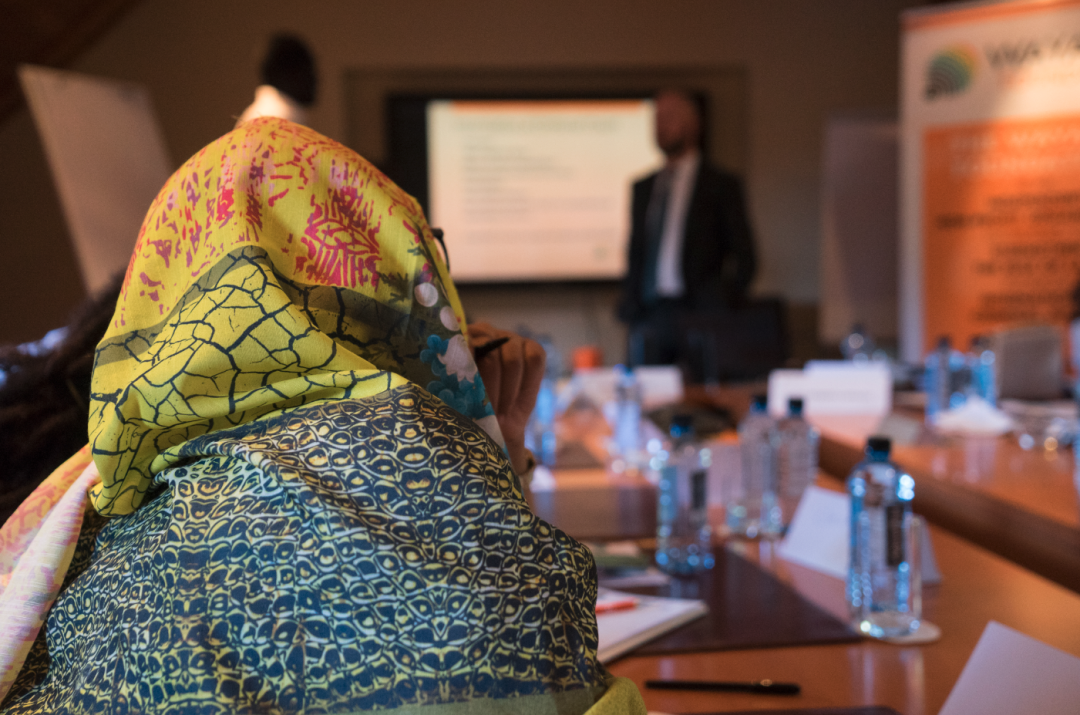7-10 November 2022, Nairobi, Kenya
As part of our two-year “Capacity building for civil society and the justice sector in Sudan” project, the Wayamo Foundation has just completed two introductory workshops in Nairobi, Kenya, for Sudanese civil society and the justice sector on how best to draw upon international criminal law and practice to further the mission of achieving accountability via national justice systems for international crimes in Sudan. The events were generously supported by the Dutch Foreign Ministry.
Two-in-one
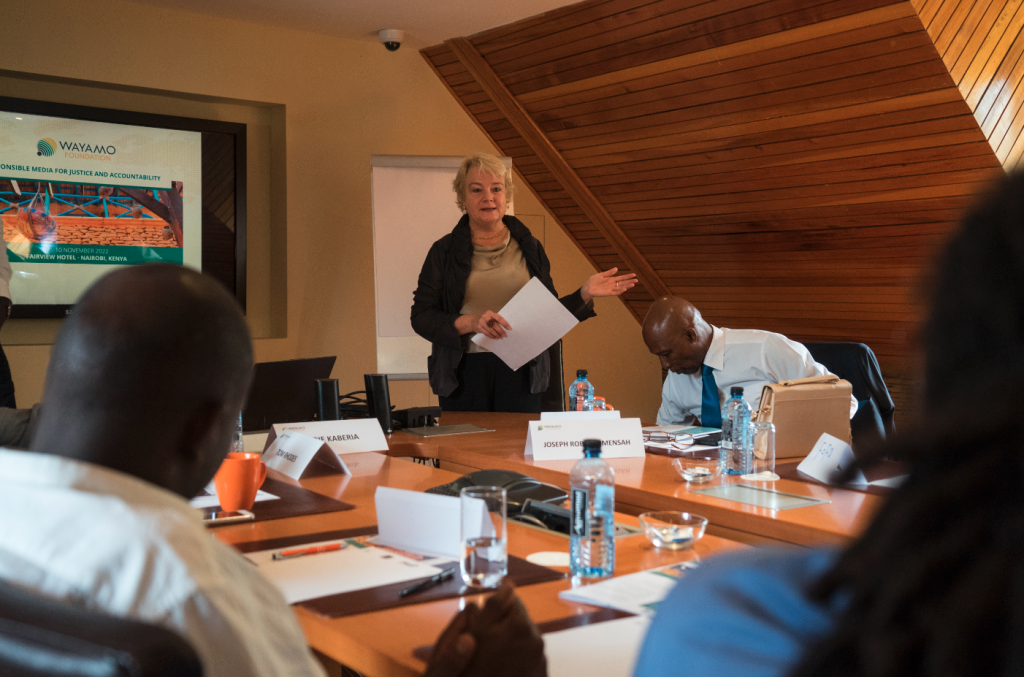
Wayamo Foundation Director, Bettina Ambach
In essence, the event consisted of two parallel workshops which drew on a central core of experts to impart purpose-specific training to legal practitioners on the one hand, and the media on the other. The proceedings were officially opened by Wayamo Foundation Director, Bettina Ambach.
Wayamo was also joined by a representative of its local partner in Sudan, the Human Rights and Advocacy Network for Democracy (HAND), Jibril Abdelbagi who sits on its board and is also a board member of the Dabanga Foundation. Abdelbagi gave a training session on transitional justice mechanisms as well as on understanding and recognising hate speech.
Legal workshop
Click here for the photo album of the legal workshop.
A cross-section of the Sudanese legal community from Khartoum and Darfur, including former and current prosecutors, individual members of the Ministry of Justice, and independent lawyers, received training on transitional justice, domestic application of international legal concepts and norms, the role of the International Criminal Court (ICC) and its limitations, modalities of complementarity with the ICC, accountability for cases of conflict-related sexual violence, as well as national and international reparations.
Keynote speaker, Betty Murungi, transitional justice expert and Advocate of the High Court of Kenya, member of the Africa Group for Justice and Accountability and Professor of practice, SOAS, took the subject of transitional justice as the workshop’s leitmotif, asking what transitional justice is, what the approaches are to implementing it, and its challenges and limitations.
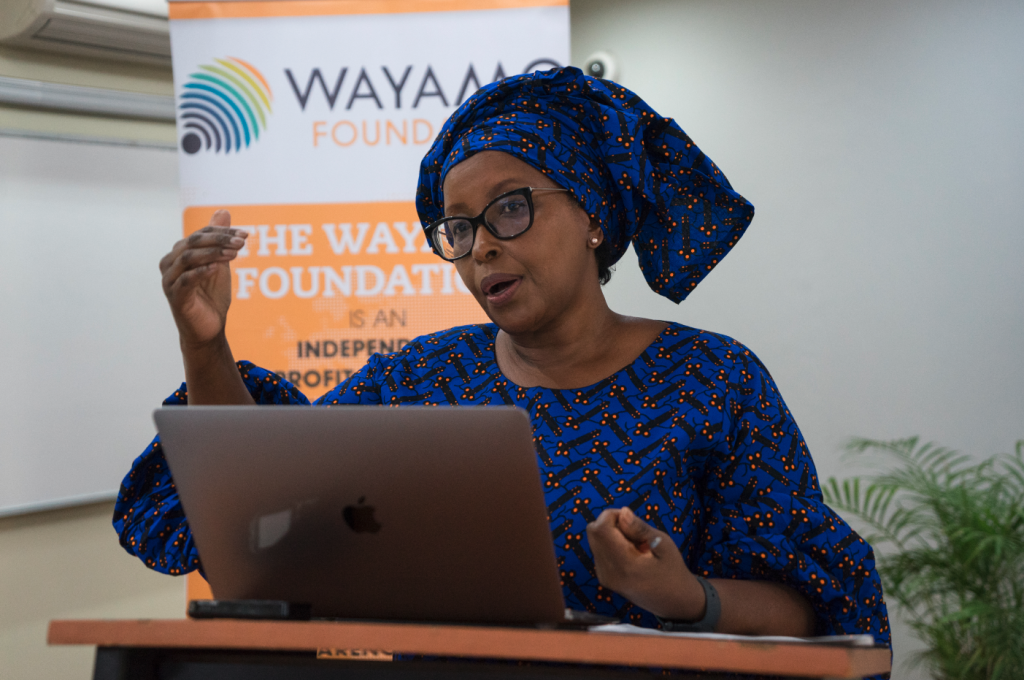
Betty Murungi, transitional justice expert and Advocate of the High Court of Kenya, member of the Africa Group for Justice and Accountability and Professor of practice, SOAS
Over the course of the workshop, international criminal justice issues were addressed with an introductory video lecture by Dapo Akande, Professor of Public International Law, University of Oxford, member of the Africa Group for Justice and Accountability, and in in-person contributions from Jehanne Henry, Independent Consultant, Human Rights Lawyer, Adejoké Babington-Ashaye, International Law Specialist and former investigator at the ICC, Dahirou Sant-Anna, International Cooperation Advisor, Office of the Prosecutor, ICC and Wayamo legal experts Linda Bore, Mark Kersten, Abdalbasit Mohamed and Mikel Delagrange.
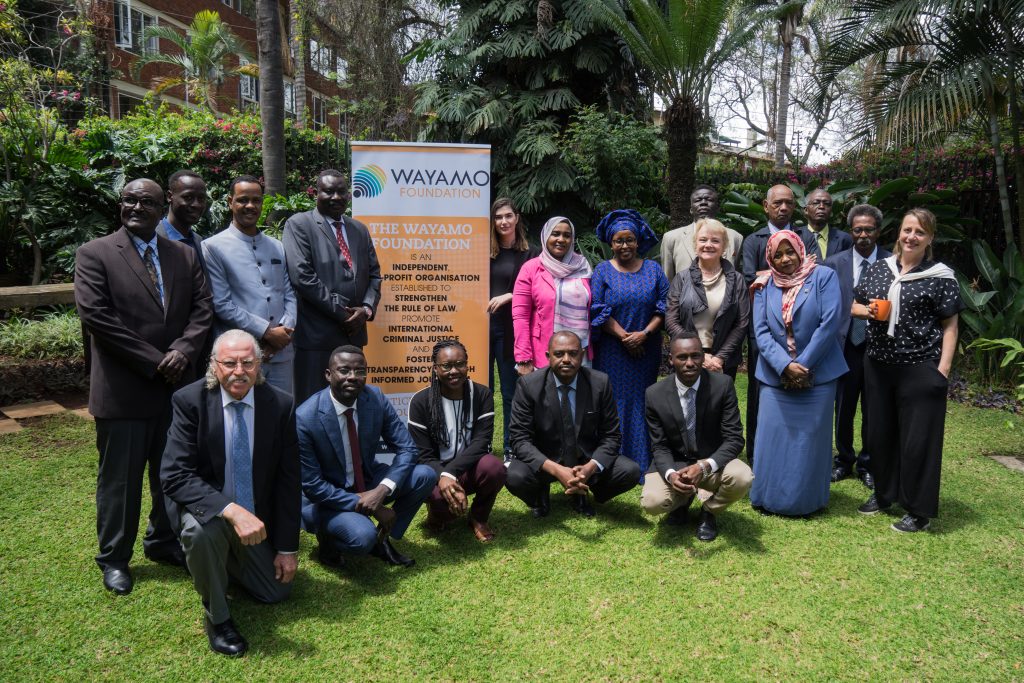
Group picture
Media workshop
Click here for the photo album of the media workshop.
At the same time, Khartoum-based and Darfuri media attended sessions designed to strengthen their reporting skills and reinforce their knowledge of journalistic ethics and critical justice-related issues, ranging from transitional justice to the documenting of human rights violations, conflict-related sexual violence, and hate speech.
The media workshop was officially opened by Wayamo Foundation Director, Bettina Ambach, Africa Director Joseph Roberts-Mensah and Coordinator for East Africa Judie Kaberia. International and Nairobi-based experts joined the group to share their expertise and hear about the experience and challenges facing Sudanese journalists: Tom Rhodes, Ayin Network, Ken Bosire, Media Trainer and Consulting Editor, Ahmed Elzobier, former researcher for Sudan at Amnesty International, Kris Kotarski, Digital Programs Manager, Wayamo Foundation and John Allan Namu investigative journalist and CEO of Africa Uncensored. Fadi El Abdallah, Spokesperson and Head of the Public Affairs Unit, ICC and Hadi al Khatib, Executive Director of Mnemonic and founder of Syrian Archive joined participants via zoom.
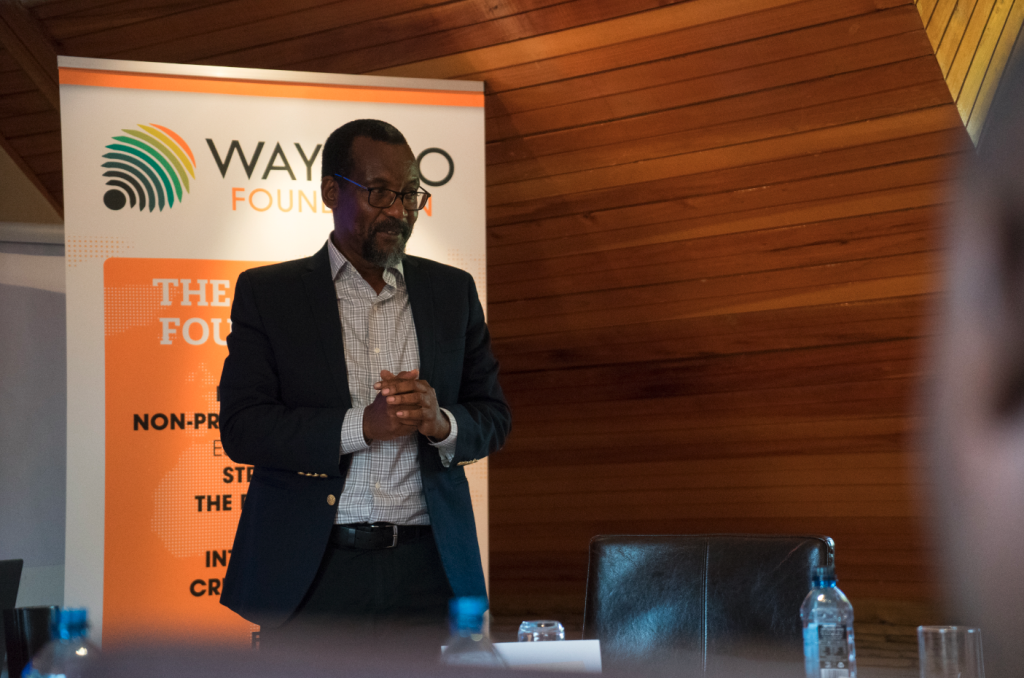
Ken Bosire, Media Trainer and Consulting Editor
Transcripts in Arabic were provided, as was consecutive interpretation during both lectures and discussions.
Neutral venue
Apart from the issue of security, the choice of venue, Nairobi, was dictated by the need for a neutral space, where people who might otherwise be unable or unwilling to enter into dialogue, could benefit from training on matters of common concern.
Prominent visitors and combined sessions
At certain key points, combined sessions were held to hear guest speakers, such as Zainab Bangura, Director-General of the United Nations Office in Nairobi, and Noordin Haji, Kenyan Director of Public Prosecutions (DPP), or alternatively, to receive training on topics of mutual interest, such as conflict-related sexual violence.
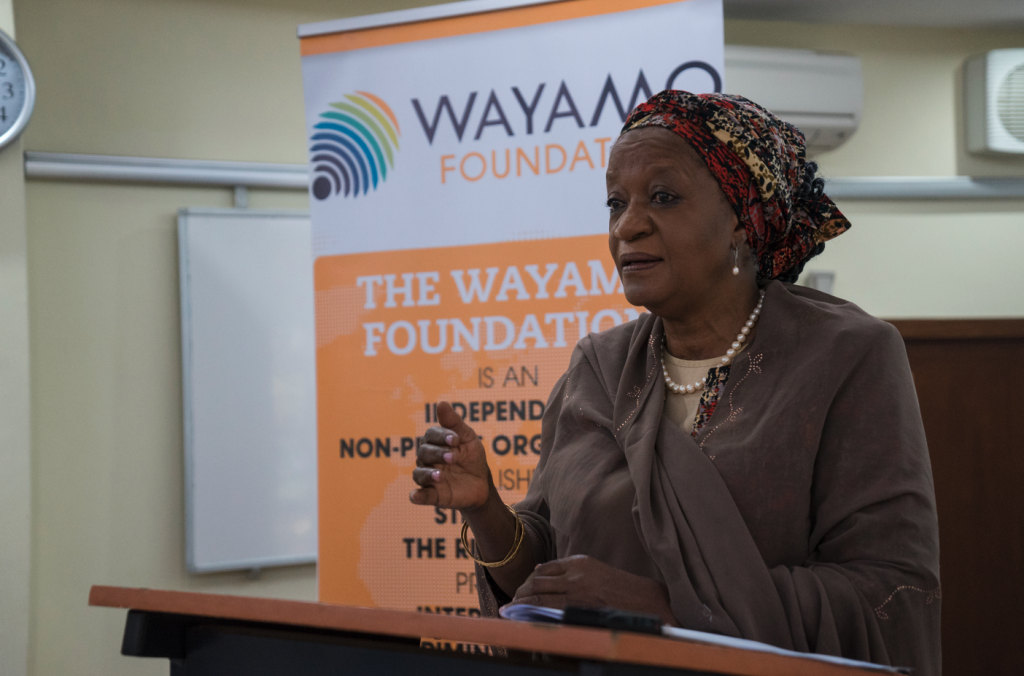
Zainab Bangura, Director-General of the United Nations Office in Nairobi
In a highly personal and inspiring talk, Zainab Bangura spoke from the heart about her experience as a “social activist” in her lifelong pursuit of democracy and peace, the pain she had felt on seeing what groups like Daesh inflicted on others, and the strength she had found in her faith as a Muslim to come to terms with that pain. To combat injustice, whether deriving from warfare or abuses such as forced marriage and female genital mutilation, the only way to achieve results is through unyielding determination, ensuring that the truth is told -both at home and abroad- and following her maxim, “There’s no stone I cannot turn!” She left her audience feeling renewed, reassured and uplifted.
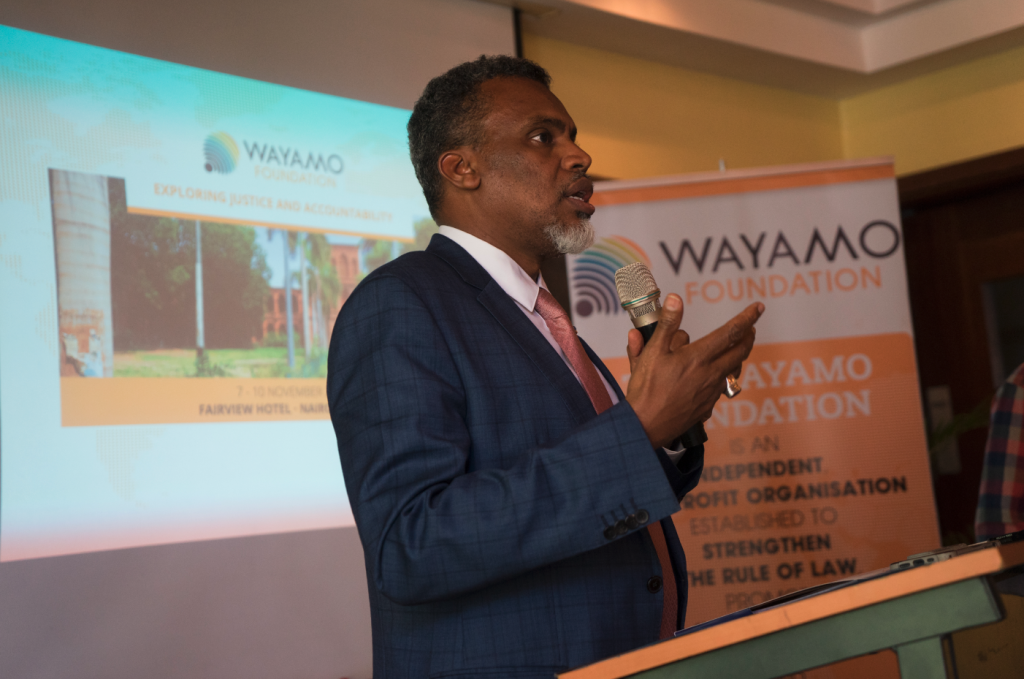
Noordin Haji, Kenyan Director of Public Prosecutions
Speaking in his capacity as Kenyan DPP, Noordin Haji gave an account of the country’s prosecutorial and policing structure. He methodically laid out the hierarchy, the reporting and accountability lines, and the remit of the police oversight authority, explaining in passing how and why things had changed with the country’s shift from a one-party to a multi-party system. He then moved on to a very recent and innovative development, whereby the decision had been taken by his Office to institute criminal proceedings against 12 police officers for crimes against humanity. This marks the first time Kenya is using the International Crimes Act to prosecute crimes against humanity in its domestic courts. Lastly, he stressed the need for journalists to be responsible “with their headlines” and said that their role was to inform the public impartially, “otherwise the messaging and its purpose become distorted”.
Judging by the sentiments expressed by the participants in their evaluations, these first two workshops can only be regarded as a promising start to more in-depth, target-specific training over the course of the next two years.
Capacity building for civil society and the justice sector in Sudan
The “Capacity building for civil society and the justice sector in Sudan” project aims to strengthen the capacity of civil society and legal actors in Sudan as they participate in the transitional justice process. Individuals will be trained in international criminal law, international humanitarian law and human rights, and will be given the knowledge required to handle serious-crime cases that come before the courts, in a manner that is both competent and effective.

